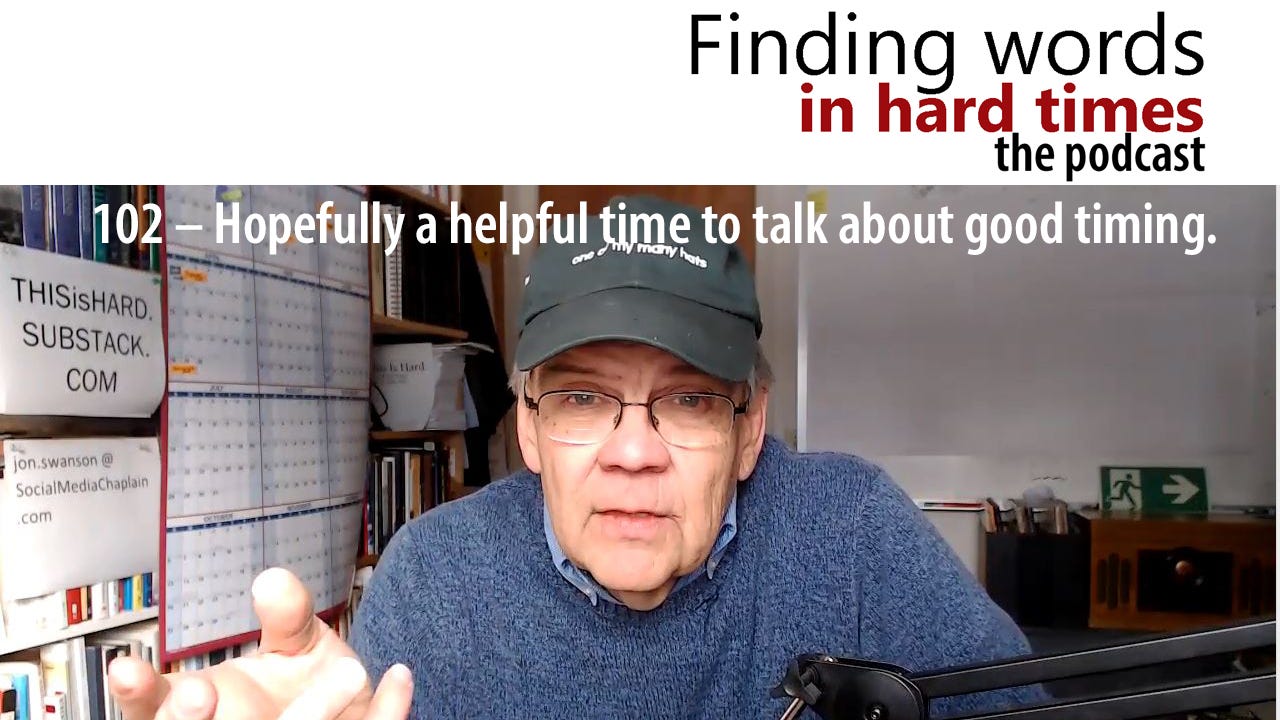Welcome back! (Or welcome!)
On the podcast today: Timing
Rather than sending you another email every week, I’m including the information about the podcast here.
It’s time to talk about timing.
Finding words in hard times means paying attention to time and timing. I talk about my history in rhetoric, about Jesus being great with timing in conversations about loss, and my idea of seconds, minutes, days, weeks, months, years, lifetimes.
102 - I hope this is a good time to talk about timing.
Watch this episode on YouTube.
Listen and subscribe on Apple podcast
+++
Have the hard conversations so I don’t have to.
Most of my hospital conversations are brief. This one was almost an hour.
I sat with a child who had decided, after talking with the physician, to move their parent to a code status of DNR.
Do not resuscitate.
It means that if the parent’s heart stops, no alarms will sound through the hospital, no pages will be sent to fifty pagers, no crowd will fill the room. Instead, someone will page the chaplain, someone will stand with the child, someone will listen to the chest for a bit and then look at the clock, and then turn to the child and say, “I’m sorry.”
In our conversation, I talked a bit about CPR, about how hard it is on a body. I pointed to the parent, unconscious, breathing being supported by a ventilator. “If they do compressions, and fracture ribs, and get a pulse back, your parent will be like now, only with broken bones and more damage.”
There wouldn’t be healing, there wouldn’t be recovery. The parent already had too many systems not working.
The child and I talked about what the parent would want in terms of care, about the sometimes fractured relationship between parent and child, about the rocky extended family relationships.
Those conversations aren’t impossible for me. I can listen and offer clarification and offer support.
What is hard for me in conversations like this is that the parent could have had these conversations.
This parent wasn’t much older than my children. This child was legally old enough to make decisions, but not by much. The illness wasn’t new. This parent could have helped this child and this family walk through these deep waters.
How can any of us be helpful to those who care about and for us? By talking with the ones we love about difficult ideas.
Be clear about appointing a healthcare agent. In most places, people can designate the person or people they want to represent their healthcare wishes. Variously called a healthcare agent, healthcare representative, or medical power of attorney, this person commits to acting on behalf of the patient. Absent paperwork, there is a state-by-state default hierarchy. That’s why this particular child was the decision-maker and faced the fear of other family members not understanding. (I wrote about this in 009 Who do you trust to speak for you? (substack.com))
Be clear about what kind of care they wanted at end-of-life. In Indiana, we can indicate whether quality of life matters to us at end of life, whether quantity of life matters, or whether we don’t want to decide. There are documents and conversation processes. But at the heart of it all is talking with each other about, as Rob Moll says, “this is what I want my last days to look like.”
Pay attention to the fractures in the relationship. “I’m sick. This isn’t going to go well. I’m not mad at you. I’ve made dumb choices. I love you.”
Talk about steps after death. For example, say “Here’s the funeral home that will be helpful to you.” Sometimes funeral arrangements can be prepaid. That can be helpful. I’m not an expert or an advocate either way.
I’m not sure I’m a fan of people who say, “No funeral,” or who say, “Here are all the details of my funeral service.” Both of those create a sense of obligation for family members who want to figure out what will be helpful to them.
Point to where the passwords are. Seriously.
Give a blessing. In your conversations with loved ones about your own death, tell them that you give them permission to take the steps that make sense to them. I don’t want to bind our kids to a particular burial plan or to giving money to a particular place. I want them to know that I love and trust them.
Do what you need to do. Of course, one of the things that matters to me is suggesting more that telling. So have the conversations you need to and arrive at the conclusions you need to. Just know that if you don’t make some decisions, like who you want to represent you, the decision will be made for you.
+++
Thanks for reading and sharing and commenting and supporting this work.
See you next week.
Jon







Very helpful. I am sure these will be helpful to many.